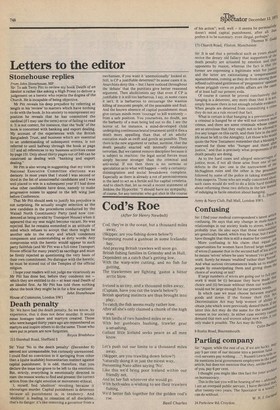Death penalty
Sir: We have had the death penalty. So we know, by experience, that it does not deter murder. It would mean hostages taken and martyrs created. Those who were hanged thirty years ago are remembered as martyrs and inspire others to do the same. Those who were put in prison are now forgotten.
Royce Bradshaw 213 Shirehall Road, Sheffield 5 Sir: Your 'No to the death penalty' (December 6) seemed not unreasonable, but curiously unreasoned. I could find no conviction in it springing from other than a (quite laudable) humanitarian instinct against capital punishment. It is odd, therefore, that you declare the issue too grave to be left to the emotions. But, strictly, everything is emotionally directed in man: the reason works to find and present the correct action from the right emotion or movement-ethical.
1, myself, find 'abolition' revolting because it encourages murder. Capital punishment is deterrent because all punishment is; in tendency. And 'abolition' is leading to cessation of all discipline: that's its danger: it's like removing a governor from a mechanism, if you want it 'unemotionally' looked at. Still, is CP a justifiable deterrent? In some cases it is. Anarchists deny this but I have noticed throughout the 'debate' that the punitists give better reasoned argument. Then 'abolitionists say that even if CP is justifiable it is still too barbarous. I say, in some cases it isn't. It is barbarous to encourage the wanton killing of innocent people, of the peaceable and frail. And the known absence of capital punishment must give certain minds more 'courage' to kill wantonly from a safe position. You yourselves, no doubt, see the barbarity of a man being led out to die. I see the horror of, for instance, a mind-developed child undergoing continuous brutal treatment until it dies a death more appalling than that of an adults' execution made as swift and gentle as possible. Then there is the new argument or rather, surmise, that the death penalty enacted will intensify retaliatory terrorism. But we cannot remove discipline because it is subject to reaction: the legal social forces must simply become stronger than the criminal and anti-social. If not then there is no surmise or speculation as to what will happen only a certainty: disintegration and social breakdown complete. Especially as there is already a rot of permissiveness in the land to act as a fertile soil for capital vendetta. And to clinch that, let us recall a recent statement of Jenkins the Hypocrite: "I should have no sympathy, of course, for any terrorist who got shot in the course
,The,
opecbator December 13, 1975 of his action"; well, well it seems he permissivelY doesn't mind capital punishment, after all. Just prefers it to be summary. even illegal, perhaps? 171 Church Road, Flixton, Manchester.
mas Go
dd Sir: It is sad that a periodical such as yours should revive the dreary old fallacy that supporters of the death penalty are actuated by emotion and he opponents by reason, whereas the fact is that the former are expressing a legitimate wish for justice] and the latter are rationalising a temperament° squeamishness, coming as they do from among those refined cultivated gentlemen of 'progressive' opinicdts whose priggish views on public affairs are the cause of at least half our present evils. Of course it cannot be proved conclusively th3t hanging is a deterrent, any more than that it is not' simply because there is not enough reliable evidence' When people are deterred from committing a crime they do not as a rule record that fact. What is certain is that hanging is a preventative: if a criminal is hanged he or she will not commit More crimes, and there are some criminals whose cr1--,0 are so atrocious that they ought not to be alloWed live any longer on this earth, and their fate in the nen life must be left to the Almighty. Let those whowow.'" quote the New Testament remember that a btessing_1; reserved for those who "hunger and thirst ate° justice," and that is precisely what proponents alit death penalty are doing. of As to the hard cases and alleged miscarriages 0 • justice, most, if not all these arise from one of defects in the law; one is the narrowness of E." McNaghten rules and the other is the procedure followed by some of the police in taking staterneotst from suspects. Those who are really concerned sh°ti such cases would do well to do a little hard thinkl about reforming these two defects in the law instea of indulging in facile emotion about hanging. N. L. rr°vers Army & Na Club, Pall Mall, London SW!.

































 Previous page
Previous page